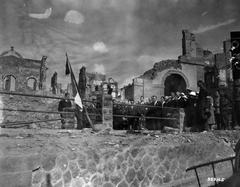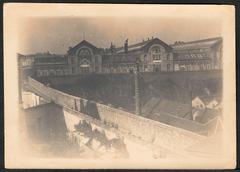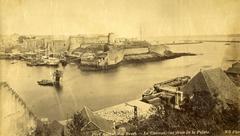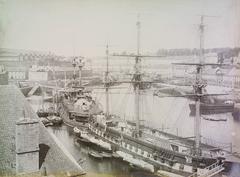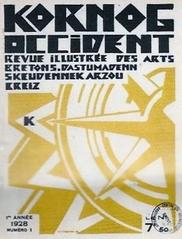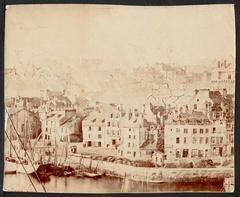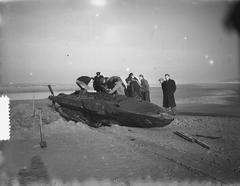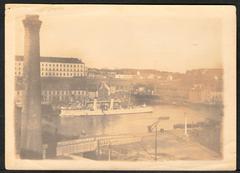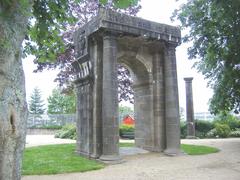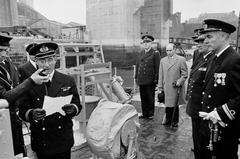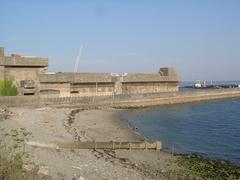Maison de la Fontaine: Complete Guide to Visiting, History, and Cultural Highlights in Brest
Date: 14/06/2025
Introduction
Maison de la Fontaine is a rare architectural and cultural treasure located in the heart of the Recouvrance district in Brest, France. As one of the few surviving pre-war buildings in the city, this late 17th- and early 18th-century stone house offers visitors a compelling glimpse into Brest’s maritime heritage and urban evolution. Today, it stands not only as a monument to the city’s resilience but also as a vibrant cultural hub, hosting contemporary art exhibitions, community workshops, and special events (actu.fr; brest.fr; brest-metropole-tourisme.fr; brestculture.fr).
This comprehensive guide covers everything you need to plan your visit to Maison de la Fontaine, from its rich historical background and architectural features to practical visitor information, accessibility, and tips for exploring Brest’s vibrant cultural scene.
Table of Contents
- History and Heritage
- Visitor Information
- Cultural Programming and Events
- Nearby Attractions
- FAQs
- Visitor Tips and Recommendations
- Conclusion
- References and Further Reading
History and Heritage
Origins and Historical Significance
Maison de la Fontaine, located at 18 rue de l’Église in Recouvrance, is a significant relic of Brest’s architectural and social history. There is some debate regarding its earliest function—some sources suggest it was built in the 18th century as a chaplain’s residence for the nearby “cimetière des noyés” (cemetery of the drowned), while others, including historian Bruno Calvès, propose that it housed the Hôpital de Recouvrance as early as 1686, based on period plans (actu.fr). Its strategic location overlooking the Penfeld River and adjacent to the Jardin des Explorateurs underscores its importance in Brest’s historic urban landscape (brest.fr).
Architectural Highlights
Maison de la Fontaine is an exemplary model of classical Brest architecture. The symmetrical façade features regular window openings and a central entrance with a monumental porch supported by kersantite columns. Local stones create a striking polychrome effect: black kersantite, yellow Logonna stone, and pink granite from Aber-Ildut are all visible in its construction (actu.fr). The building also has a mansard roof with dormer windows, adding both character and light.
A rare granite monolithic cross, originally from the former Cemetery of the Drowned, stands at the building’s chamfered corner, further emphasizing the site’s layered spiritual and communal significance (wiki-brest.net).
The Lunven Fountain
Attached to the building is the Lunven Fountain (Fontaine de la Soif), constructed in 1761. Though commissioned under Mayor Antoine Raby, it bears the name of his successor, Jean-Baptiste Lunven de Kerbizodec. Crafted from Aber-Ildut granite and featuring lion-head water spouts, the fountain originally provided water via an aqueduct from Saint-Pierre-Quilbignon. A Latin inscription commemorates Mayor Lunven’s civic contribution: “If your thirst, Brestois, is quenched by this water thanks to Mayor Lunven, keep it in your grateful heart” (actu.fr; pop.culture.gouv.fr).
Restored and reconnected to water in 1993, the fountain can be viewed by visitors descending into the building’s cellar, though this area is not wheelchair accessible.
Preservation Efforts
The building served as part of the Hôpital de Recouvrance until 1825 before being purchased by Yves Collet, chief sculptor at the Brest naval arsenal. The Collet family maintained ownership for nearly a century, and an exhibition dedicated to Yves Collet is now displayed in the basement (petitfute.com).
Threatened by demolition in the late 20th century, the house was saved by local heritage advocates, Les Amis de Recouvrance, and acquired by the city of Brest in 1980. It is one of the few buildings in Recouvrance to survive the Allied bombings of 1944 (petitfute.com).
Visitor Information
Opening Hours and Tickets
- Tuesday to Saturday: 14:30 – 18:30
- Wednesday: 10:00 – 12:00 and 14:30 – 18:30
- Closed: Sundays, Mondays, and public holidays
- Admission: Free of charge; no tickets required
During special events (such as European Heritage Days), hours may be extended. Always check the official website or Brest Culture for current schedules.
Location and Getting There
Maison de la Fontaine is located at 18 rue de l’Église, Brest, within the historic Recouvrance district.
- Public Transport: Bus lines 1 and 7 serve the nearby area.
- Walking: Easily accessible from the city center via the iconic Pont de Recouvrance.
- Parking: Limited street parking is available; public transportation is recommended.
Accessibility
As a historic structure, Maison de la Fontaine has some accessibility limitations. The main exhibition spaces are on the ground floor, but steps and uneven surfaces are present, and the cellar (where the fountain can be viewed) is not accessible to those with reduced mobility. Visitors with specific needs are encouraged to contact the venue in advance.
Facilities and Services
- Restrooms: Available on-site.
- No Café: Dining options are available in the surrounding Recouvrance neighborhood.
- Guided Tours: Can be arranged for groups with advance notice; check with the venue or Brest tourist office.
Cultural Programming and Events
Maison de la Fontaine is a dynamic cultural venue featuring:
- Rotating Exhibitions: Showcasing painting, photography, sculpture, and multi-media by local, regional, and international artists.
- Workshops and Educational Activities: Programs for adults and children, often in partnership with institutions like the Musée des Beaux-Arts (brest.fr; brest-metropole-tourisme.fr).
- Community Events: Vernissages (opening receptions), artist talks, and collaborations with cultural groups such as Bad Seeds and Longueur d’Ondes.
Photography: Allowed in most areas, but please check for restrictions during temporary exhibitions.
Nearby Attractions
Enhance your visit by exploring other nearby points of interest:
- Tour Tanguy: Medieval tower museum with panoramic views
- Jardin des Explorateurs: Scenic garden overlooking the Penfeld
- National Maritime Museum: Explore Brest’s naval heritage (wiki-brest.net; brestculture.fr)
- Recouvrance District: Historic neighborhood with shops, cafés, and local character
FAQs
Q: What are the opening hours of Maison de la Fontaine?
A: Tuesday to Saturday, 14:30–18:30; Wednesday also 10:00–12:00; closed Sundays, Mondays, and public holidays.
Q: Is admission free?
A: Yes, entry is free for all visitors.
Q: Is Maison de la Fontaine accessible for people with disabilities?
A: Some areas have steps and uneven surfaces; full accessibility is limited. Contact the venue in advance for specific needs.
Q: Are guided tours available?
A: Yes, typically for groups and during special events; advance arrangements are recommended.
Q: Can I take photographs inside?
A: Generally allowed, but policies may vary depending on the exhibition—ask staff on arrival.
Q: Where can I check current exhibitions and events?
A: Visit the official Maison de la Fontaine page.
Visitor Tips and Recommendations
- Check the latest exhibition schedule on the official website before visiting.
- Arrive early during special events or vernissages to avoid crowds.
- Wear comfortable shoes due to cobbled streets and steps in the historic district.
- Combine your visit with other nearby sites like Tour Tanguy and Jardin des Explorateurs for a full day of discovery.
- Download the Audiala app for curated cultural guides and up-to-date event listings in Brest.
Conclusion
Maison de la Fontaine is an essential destination for anyone interested in Brest’s history, architecture, and contemporary cultural life. Its blend of historic ambiance and vibrant programming makes it a standout among Brest’s attractions. Whether you are a history enthusiast, art lover, or curious traveler, a visit to Maison de la Fontaine offers a memorable and enriching experience.
Plan your visit, explore the rotating exhibitions, participate in creative workshops, and immerse yourself in the enduring heritage and artistic spirit of Brest.
References and Further Reading
- Maison de la Fontaine Brest: Visiting Hours, Tickets, and Historical Insights, 2024, (actu.fr)
- Maison de la Fontaine Official Page, 2024, City of Brest, (brest.fr)
- Maison de la Fontaine Brest Cultural Guide, 2024, Brest Métropole Tourisme, (brest-metropole-tourisme.fr)
- Maison de la Fontaine and Musée Fontaine, 2024, Brest Culture, (brestculture.fr)
- Maison de la Fontaine in Brest: History, Architecture, Visiting Hours & Tips for Visitors, 2024, (wiki-brest.net)
- Fontaine de la Soif, (pop.culture.gouv.fr)
- Maison de la Fontaine Brest, (petitfute.com)
For further information, virtual tours, and cultural updates, visit the official Brest tourism website and follow local cultural channels and the Audiala app.
